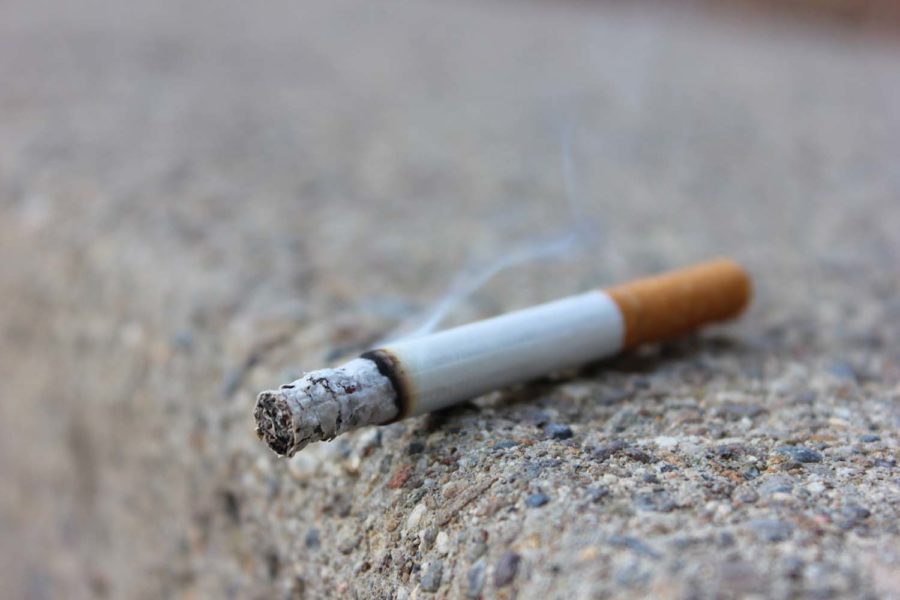Senate Council forms tobacco-free campus committee
Pitt is considering banning smoking on University property. 9Image via Flickr//Lindsay Fox)
October 11, 2019
As of Oct. 1, 2,044 colleges in the United States have adopted a 100% tobacco-free campus, according to the American Nonsmokers Rights Foundation. Pitt is considering following suit and amending its smoking policies to ban tobacco and smoking on campus.
During a Sept.18 University Senate Council meeting, Senate President Chris Bonneau said Pitt and its Wellness Center are pushing to make Pitt a tobacco-free campus by the spring semester of 2020.
The initiative is part of an effort to make Pitt a more health-conscious place, with multiple groups working together to make the policy a reality, Bonneau said this week.
“It’s a total wellness package,” Bonneau said. “We’ve also worked with the Student Government Board [and] Wellness Committee, Eric Macadangdang was involved … it was a holistic effort.”
Since Penn State University adopted a tobacco-free campus in the fall of 2018, all activities regarding tobacco, including distribution and sales, are strictly prohibited on Penn State property. The University of Pennsylvania has also adopted tobacco-free policies. Both include electronic cigarettes and hookah in their policies as prohibited items, as at many other schools.
Pitt’s current tobacco policy prohibits smoking inside all University buildings and facilities. Pitt policy also prevents smoking within 15 feet of the entrances and HVAC units of all Pitt-owned and leased property.
What a “tobacco-free” Pitt would look like is still under debate by the Benefits and Welfare Committee, the main committee overseeing Pitt’s policy to become tobacco-free. The University’s mission is to make its stance on tobacco clear through education and increased awareness of this initiative, Bonneau said.
“We want to see much more educating. I don’t think we’re gonna see steep fines or anything else, but we do want to set the tone much like many of our peer institutions have,” Bonneau said. “It really depends on what the committee comes up with and what they recommend and the reasons behind it.”
This initiative for a tobacco-free Pitt has been proposed before. According to a University Times article, the idea first arrived on campus in the fall semester of 2015 when a group from the Graduate School of Public Health proposed Pitt become tobacco- or smoke-free.
The initiative was revitalized in October 2018 by the Student Government Board and University Senate Council, though some opposed the idea. Linda Tashbook, former chair of the Welfare Committee, cited multiple reasons for her opposition to the committee, including the possibility that making Pitt a tobacco-free campus would make prospective employees that smoke feel unwelcome.
On the recommendation of the Welfare Committee, the Senate created an ad hoc committee chaired by Esa Matius Davis designed to bring the tobacco-free Pitt initiative forward. The ad hoc committee is tasked with evaluating current cessation programs for their efficiency and quantitatively determining the effect of secondhand smoking in Oakland. Davis said the committee will present its findings to Chancellor Patrick Gallagher in a report at the end of the year.
“We have only begun our work, which will be a year-long process of research and review,” Davis said in an email.
The University currently has a smoking cessation program to help Pitt students quit smoking. The QUIT program is a multistep program that encourages freedom from nicotine and tobacco by utilizing nicotine patches to help during the cessation process. Additional nicotine replacement therapy options are available upon request through QUIT.
Despite QUIT’s aid, students on campus can still be affected by smoking if they have mild to severe asthma. Madison Ricker, a junior political science and English writing major, knows the problem of secondhand smoke all too well.
“As a public health issue, smoking and secondhand smoke especially are big issues,” Ricker said. “People like me who have pretty bad asthma, being around that isn’t always the best.”
But Ricker is empathetic with smokers and why they may smoke, noting that some smokers need smoking to relax or use it as a coping device.
“You also have to think about what kind of people are more likely to use tobacco products and what that really means,” Ricker said. “I think unless the University is going to put other things in place like providing workshops to help people quit and having other alternatives, I don’t know if it will work.”
For now, research must be conducted and data must be analyzed to see if a drastic change in Pitt’s policy is required to keep students and faculty healthy. However, people on campus are worried that Pitt creating these policies is infringing on their freedom to do as they please. Bonneau said Pitt is taking that into consideration.
“It’s a balancing aspect and it’s not like we’re trying to be Big Brother and tell people what to do, but [secondhand smoke] has serious consequences,” he said.



